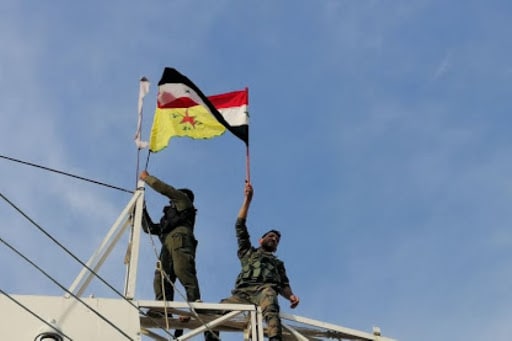Russian efforts have failed to succeed in negotiations between the Syrian Democratic Forces (SDF) and the regime, following the end of the second round of negotiations, which did not reach solutions to the problem of the restrictions imposed by the SDF in Hassakeh on the regime. The latter responded by tightening the noose on the SDF in Tel Rifaat in the Aleppo countryside, the Ashrafieh neighborhood, and Sheikh Maqsoud in Aleppo.
An informed source from Hassakeh told Baladi News that the city witnessed, on Wednesday, a dangerous escalation between the SDF and the regime forces, explaining that the SDF are deployed at all the main road intersections that lead to the security square, to put further restrictions on the regime forces.
The source, who spoke on condition of anonymity, indicated that the shops on Palestine Street, in the center of Hassakeh, closed their doors as a result of the increase in the military personnel of the two parties, pointing out that the people of the city preferred to stay away from the contact areas and the main streets, for fear of clashes.
The source said that matters are unlikely to slip into a military confrontation between the two parties, since the SDF are aware that any clash with the regime means the latter’s evacuation from the military fronts north of Hassakeh and Raqqa, which borders the Turkish Operation Peace Spring area, which would pave the way for a Turkish military operation, because a withdrawal of the regime would naturally mean the end of the Turkish-Russian understandings, which resulted in the suspension of Operation Peace Spring more than a year ago.
Journalist Samer al-Ahmad, who is from Qamishli in Hassakeh, considered that the escalation at this particular time is related to the fact that this is a transitional period that’s witnessing the arrival of a new American administration, an administration which the SDF considers friendly, while Moscow tries to increase its influence and preempt any emergency by increasing the number of its forces, which it calls the “peacekeepers” or “separation” forces.
Ahmad pointed out that the Russians are trying to prevent any clashes in Hassakeh and Qamishli between the Assad regime and the SDF, because that would mean a US intervention in favor of the latter, which could lead to a reduction in control for the regime and Russia, even to potentially losing some of the areas they recently spread in.
He pointed out that the SDF spread the news through social media accounts loyal to it that it had given the regime forces a deadline to withdraw, considering it possibile for the SDF to assume control of Hassakeh and expel the regime from it, excluding Qamishli, which has a different status for a few reasons — including the fact that there are some tribes that support the regime there and the presence of the airport and a military regiment near it, which is controlled by the regime, with Russian support.
Ahmad explained that the SDF is being ambitious with regards to its demands this time around, pinning hopes on the next American administration, which has reappointed Brett McGurk as a special envoy to the region. McGurk is known to be one of the biggest supporters of the SDF. The appointment of Lloyd Austin as Defense Minister is also advantageous as he previously worked to form the Awakening Movement in Iraq.
The head of the opposition Hassakeh Political Authority, Mudhar al-Asaad, considered the tension to be temporary and not strategic, because the Democratic Union Party, the political face of the Kurdish units that lead SDF, is part of the regime’s system, and they are both part of the Iranian project in Syria.
In his interview with Baladi News, Asaad said that confrontations between the regime and the SDF have happened more than once in recent years, increasingly putting pressure on the people of Hassakeh, stressing that the presence of either side in Hassakeh is linked to the existence of the other.
This article was translated and edited by The Syrian Observer. The Syrian Observer has not verified the content of this story. Responsibility for the information and views set out in this article lies entirely with the author.


